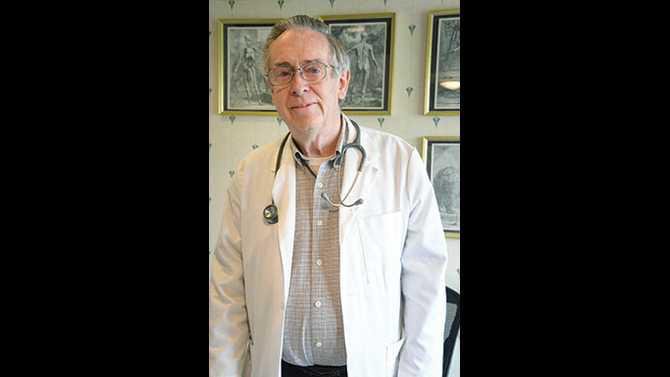When Dr. Robert “Bob” Faulkner first began practicing medicine in Newton County 50 years ago, an office appointment cost $3. Waiting rooms were segregated by race. There were no mental health facilities, and delinquent children were subjected to the regular court system.
But where Faulkner saw the need for change, he pushed for it, and by the time he retires in May, he will have a long legacy of community service to look back on.
A native of McCormick, South Carolina, Faulkner was moved to study medicine by his desire to go on medical missions. He studied at Emory and Baylor before completing his surgery residency in Shreveport, Louisiana, and also studied at Columbia Theological Seminary in Decatur.
He first began working at the Newton County hospital in 1964, and opened his own practice a year later.
“I came in as the young radical,” he recalls, sitting in his office overlooking Highway 278. A series of replicas of 17th century medical etchings adorn the wall behind him.
“I was the first not to have a segregated waiting room,” he said. “It made my black patients a little uncomfortable when they asked where they could sit and we told them they could sit wherever they wanted.”
At the time, before Medicare and Medicaid, poor people had very limited access to health care, and treatment options were few. All the local doctors were “very general practitioners.” CT scanners and magnetic resonance imaging (MRI) had yet to be invented, and there were only three or four antibiotics.
“All of us did everything, from delivering babies to surgery to anesthesia,” Faulkner said. “We did the best we could in that era.”
Among the gaps in service was the lack of resources for mental health. Faulkner, who had studied psychology at Emory University, helped found the first mental health clinic in the county, comprised mostly of volunteers and located in a building donated by the Episcopal Church.
“It [mental illness] was not understood and we had no facilities except to send people off to Milledgeville, which was the big state mental hospital at the time, so this was really quite advanced that we had at least one professional and a volunteer support group, and that was the start of the mental health association,” said Faulkner.
He was also asked by the local school system to spearhead the establishment of the county’s first juvenile court system, a responsibility he happily shouldered.
“It’s related to health; it’s related to public health, and those are areas that I have a concern for,” he says.
Throughout his career, Faulkner strove to serve not only his own patients, but to improve access to healthcare for the entire county. As five-term chief of staff at the hospital, he pushed for better equipment and more coverage, even on weekends, which was uncommon for a small hospital at the time.
Faulkner, an ordained Baptist minister, also followed his calling abroad in Africa and South America. He spent time in Zimbabwe and Ghana in 1960 and 1970, treating thousands of patients in underserved, rural areas. Five years ago, when he was in his seventies, he travelled to Honduras to do the same.
Whether he is working in a foreign hospital or his office on Mill Street, Faulkner says he tries to remember the message of Jesus.
“[I make] an effort to be considerate and caring above all else, really,” he says, reflecting on the influence of his faith on his medical practice.
While he has no specific plans for his retirement, Faulkner, 78, is looking forward to spending more time with his family, especially his grandchildren. After so many years of work and service, however, he admits that the prospect of retirement is “bittersweet.”
He says, “I’d like for my patients to remember me as someone who really cared about them, not just [their] physical well being, but cared about them as people.”





